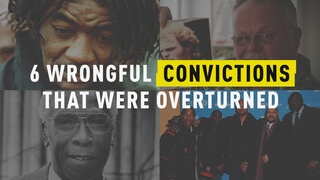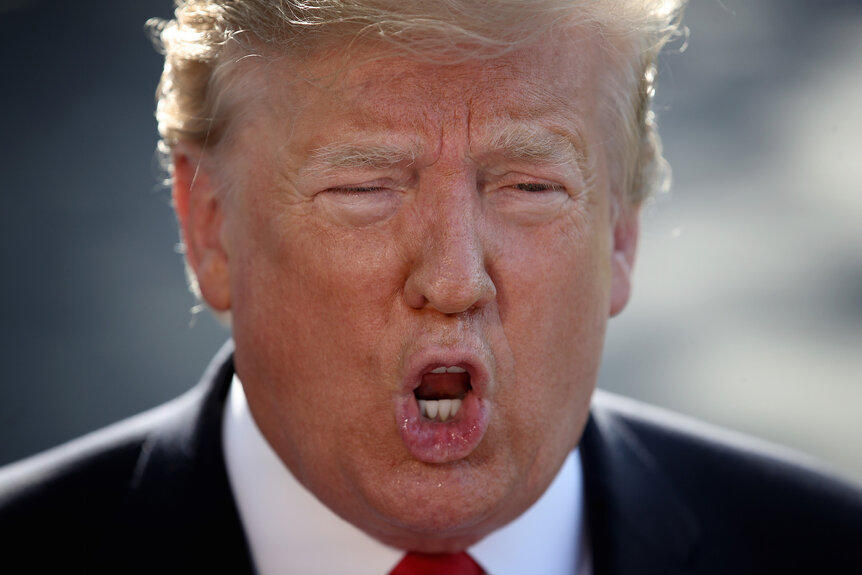Create a free profile to get unlimited access to exclusive videos, breaking news, sweepstakes, and more!
How Was Donald Trump Involved In The Central Park Jogger Case?
Donald Trump notoriously inserted himself into the Central Park jogger case.

The media frenzy that surrounded the rape and assault of 28-year-old investment banker Trisha Meili in the spring of 1989 infamously catalyzed larger conversations about policing, crime, and racial relations in America. The controversial arrests of five teenagers — four African American and one Hispanic — led to public outrage when the accused said their confessions had been coerced. As the situation unfolded, politicians and citizens alike began offering their takes on the ordeal — but perhaps no voice was louder than that of Donald Trump, who at the time was known more as a real estate mogul and socialite than as a politician.
As explored in Ava DuVernay's recently-debuted Netflix series, "When They See Us," Trump's involvement in the case would have significant ramifications for years to come.
The attack on Meili in New York City's Central Park on April 19, 1989 left the young woman in a coma for 12 days. That same night, police arrested Raymond Santana, Kevin Richardson, Antron McCray, Yusef Salaam and Kharey Wise — a group of 14- to 16-year-olds who were believed to be part of a larger group of approximately 30 teens accused of a handful of assaults and other lesser crimes that same night.
The kids were subject to a lengthy interrogation — in a 2016 Washington Post op-dd, Salaam claimed he had been deprived of food, water, and sleep for over 24 hours — eventually leading them to say the confession police got at the time was obtained unjustly.
As Meili regained consciousness, Donald Trump (who had recently become a best-selling author with his book "Art of the Deal") paid approximately $85,000 to take out a full-page advertisement in several prominent New York City newspapers, according to Esquire. In large, bold text, the page read: “BRING BACK THE DEATH PENALTY. BRING BACK OUR POLICE.”
"At what point did we cross the line from the fine and noble pursuit of genuine civil liberties to the reckless an dangerously permissive atmosphere which allows criminals of every age to beat and rape a helpless woman and then laugh at her family’s anguish?" Trump wrote in smaller text beneath. "I want to hate these murderers and I always will. I am not looking to psychoanalyze or understand them, I am looking to punish them … I no longer want to understand their anger. I want them to understand our anger. I want them to be afraid."
The New York Times noted shortly after the attack that Meili's case had garnered a considerable amount of attention compared to 28 similar rapes and assaults against women of color from that same week, leading many to wonder about the motivation behiind Trump's statements.
''The Central Park attack was treated as extraordinary,'' Francoise Jacobsohn, president of the New York City Chapter of the National Organization For Women, told The Times. ''It was not extraordinary. Sexual violence is a continuing problem. But we only talk about it when it's on the front pages. It happens all the time.''
Trump, meanwhile, appeared on Larry King's show to defend his actions.
"Maybe hate is what we need if we're gonna get something done," he told King in 1989, according to CNN.
Conservative political personalities, perhaps taking cues from Trump, called for even more violent retribution. Pat Buchanan at the time demanded one of the accused should be "tried, convicted and hanged in Central Park," according to the Salt Lake City Tribune.
Salaam recalled the terror he felt upon seeing the calls for his execution.
“I knew that this famous person calling for us to die was very serious,” Salaam wrote in the Washington Post. “We were all afraid. Our families were afraid. Our loved ones were afraid. For us to walk around as if we had a target on our backs, that’s how things were.”
Despite no physical evidence linking any of them to the crime and the descriptions of the alleged perpetrators not matching that of the accused, McCray, Richardson, Salaam and Santana were sentenced to 5 to 10 years in a juvenile detention facility, according to AMNY. Wise, the only teen tried as an adult, was sentenced to 5 to 15 years in prison.
It is impossible to determine the extent to which Trump's influence may have impacted the jury at the time. Michael Warren, the veteran New York civil rights lawyer who represented the Central Park Five in court, argued that his clout indubitably effected the jury.
“He poisoned the minds of many people who lived in New York and who, rightfully, had a natural affinity for the victim,” Warren told The Guardian in 2016. “Notwithstanding the jurors’ assertions that they could be fair and impartial, some of them or their families, who naturally have influence, had to be affected by the inflammatory rhetoric in the ads.”
In 2002, Matias Reyes, a convicted murderer and serial rapist who had been serving a minimum 33-year prison sentence on unrelated charges, confessed to the attack on Meili. His DNA matched with samples from the crime scene. However, he was never tried: The statute of limitations on the case had expired.
That same year, then-Manhattan District Attorney Robert Morgenthau recommended that the charges brought against the original group of accused teens be dropped. The original indictments were ultimately dismissed and the men were freed, despite protests from local police forces.
In 2014, after the Central Park Five won more than $40 million in a settlement with New York City, Trump continued to denigrate the exonerated individuals.
"My opinion on the settlement of the Central Park Jogger case is that it's a disgrace," Trump wrote in an op-ed for the New York Daily News. "The recipients must be laughing out loud at the stupidity of the city. Speak to the detectives on the case and try listening to the facts. These young men do not exactly have the pasts of angels."
The issue of Trump's belief in the guilt of the Central Park Five despite overwhelming evidence again arose during the 2016 election cycle when he was asked about the case.
"They admitted they were guilty," Trump said to CNN in a statement. "The police doing the original investigation say they were guilty. The fact that that case was settled with so much evidence against them is outrageous. And the woman, so badly injured, will never be the same."
Hillary Clinton's campaign immediately rebutted Trump's claims in a statement.
"The facts here are clear: These men were exonerated. Another man has admitted to committing the crime, as proven by DNA evidence," the campaign said in a statement, according to NBC News. "Trump rushed to judgment on the case, has refused to admit he is wrong and continues to peddle yet another racist lie, a pattern for him and a clear reason why he is unfit to be president."
New York Times political commentator Sarah Burns attempted to explain Trump's commitment to his narrative of the Central Park Five story in a 2016 op-ed.
"Race and racism surely play their role," Burns wrote. "So does the cognitive trap that psychologists call anchoring and what we call first impressions: Mr. Trump quickly jumped to conclusions about their guilt, as did many in New York City."
Salaam continues to speak out against Trump's accusations, asserting the indelible role the President had played in the case.
"I look at Donald Trump, and I understand him as a representation of a symptom of America,” said Salaam at a Town & Country Philanthropy Summit in May of 2019, according to Esquire. "We were convicted because of the color of our skin. People thought the worst of us. They created superpredator laws because of what happened. And all of this because prominent New Yorkers — especially Donald Trump."


























